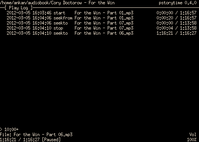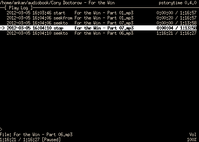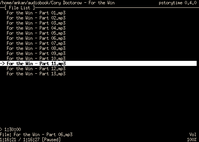Let me introduce to you Pstorytime.
A while before the pandora rebirth competition went live I started working on an audiobook player that behaves the way I want. This is the result. Since the competition started I thought I'd release it as an entry. The intention has always been to run this on my pandora, though I haven't received mine yet. It should all work equally well on any other GNU/Linux device (so far only tested on Debian Squeeze.)
This is a general console application and is not directly connected to any shoulder buttons or such. But pstorytime can be controlled by writing commands to a pipe, so if you can find a program that listens for those buttons and runs custom commands you are ready to go.
And a few screenshots.

You can enter a position to seek to, or a distance to seek. (In this case 10 minutes forward.)

Or select a position you have already been at and seek there.

Or seek to a certain file. In this case to 1 hour and 30 minutes into that file.
And some help output (which happens to be quite a lot to read.)
Edit: The forum has obviously messed up the formatting a bit. The real thing looks better.
A while before the pandora rebirth competition went live I started working on an audiobook player that behaves the way I want. This is the result. Since the competition started I thought I'd release it as an entry. The intention has always been to run this on my pandora, though I haven't received mine yet. It should all work equally well on any other GNU/Linux device (so far only tested on Debian Squeeze.)
This is a general console application and is not directly connected to any shoulder buttons or such. But pstorytime can be controlled by writing commands to a pipe, so if you can find a program that listens for those buttons and runs custom commands you are ready to go.
Code:
pstorytime
----------
pstorytime is a logging console audiobook player based on gstreamer with a
curses interface. It stores all events like play, pause and seek together with
walltime, filename and position in file. It also autosaves the position while
playing to recover from crashes without loosing the position. This allows the
user to retrace his/her steps and minimizes the risk of getting lost.
Furthermore, it treats all files as a continuous stream so that seeking can be
made seamlessly between different files.
Dependencies
------------
* python - Only tested with python 2.
* argparse - Included in python >=2.7 and >=3.1.
* pygst - Python gstreamer bindings.
* gstreamer - Including any codecs which you wish to be able to use.
Installation
------------
> python setup.py build
> sudo setup.py install
License
-------
GNU General Public License: [url="http://www.gnu.org/licenses/gpl-3.0.txt"]http://www.gnu.org/l...ses/gpl-3.0.txt[/url]And a few screenshots.

You can enter a position to seek to, or a distance to seek. (In this case 10 minutes forward.)

Or select a position you have already been at and seek there.

Or seek to a certain file. In this case to 1 hour and 30 minutes into that file.
And some help output (which happens to be quite a lot to read.)
Code:
usage: pstorytime [-h] [--extensions EXT] [--autolog-interval SECS]
[--backtrack SECS] [--cmdpipe [PATH]] [--playlog-file PATH]
[--conf-dir PATH] [--conf [PATH]] [--lastdir-file [PATH]]
[--autoplay BOOL] [--autoquit BOOL] [--loop N]
[--volume VOL] [--default-bindings BOOL] [--bind KEY EVENT]
[--unbind KEY] [--event-len N] [--keytime MSECS]
[--errortime MSECS] [-v] [--gst-pipeline STR]
[--gst-link FROM TO]
[path] [position]
pstorytime is a logging console audiobook player based on gstreamer with
a curses interface. It stores all events like play, pause and seek
together with walltime, filename and position in file. It also
autosaves the position while playing to recover from crashes without
loosing the position. This allows the user to retrace his/her steps and
minimizes the risk of getting lost.
Furthermore, it treats all files as a continuous stream so that seeking
can be made seamlessly between different files.
positional arguments:
path Audiobook directory, possibly including a file to
start playing at. (Default: Load last directory.)
position Position to start playing at. See section on
positions. (Default: None)
optional arguments:
-h, --help show this help message and exit
--extensions EXT Comma separated list of additional extensions to treat
as audiobook files. (Default: None)
--autolog-interval SECS
How often (in seconds) the position should be
autosaved so that the position can be recovered upon
crashes, including loss of power etc. (Default: 60)
--backtrack SECS How far (in seconds) to automatically backtrack after
pausing. (Default: 10)
--cmdpipe [PATH] Optional path to a pipe that commands are read from
relative to current directory. If no path is given,
the cmdpipe is disabled. See section on paths.
(Default: {conf}/cmdpipe)
--playlog-file PATH Path to the file to save playlog in relative to
current directory. See section on paths. (Default:
{conf}/logs/{audiobook}/.playlog)
--conf-dir PATH Configuration directory (Default: ~/.pstorytime)
--conf [PATH] Path to main configuration file relative to current
directory. If no path is given, the main configuration
file is disabled. This option has no effect if placed
in the main configuration file. See section on paths.
(Default: {conf}/config)
--lastdir-file [PATH]
Path to the file where the last loaded directory is
stored. If no path is given, the use of this file is
disabled and the current directory will always be used
instead. See section on paths. Using the {audiobook}
does not make much sense since it is not yet known.
(Default: {conf}/lastdir)
--autoplay BOOL Start playing when the audiobook is started. (Default:
False)
--autoquit BOOL Quit when the audiobook ends and the player is not
looping any more. (Default: False)
--loop N Number of times to continue playing from the beginning
when the audiobook ends. Negative number for
infinitely many times. (Default: 0)
--volume VOL Playback volume as a float between 0 and 10. (Default:
1.0)
--default-bindings BOOL
Load default bindings. Otherwise all bindings need to
be added manually. (Default: True)
--bind KEY EVENT Add new binding from key to event. Key names are
displayed in the program when pressed, possible events
are listed in its own section.
--unbind KEY Remove binding for the given key. Key names are
displayed in the program when pressed.
--event-len N Number of characters to display of event names in the
playlog. (Default: 8)
--keytime MSECS Number of milliseconds to display the name of the last
key pressed. (Default: 1000)
--errortime MSECS Number of milliseconds to display the last error
message, set it to a negative value to show it
forever. (Default: 5000)
-v, --version Show version information.
--gst-pipeline STR The gstreamer pipeline to use. Should contain a
filesrc and volume component named file-source and
volume-control respectively. (Default: filesrc name
=file-source ! decodebin2 name=decoder identity
name=postdecode ! audioconvert ! audioresample !
volume name=volume-control ! autoaudiosink)
--gst-link FROM TO Automatically add links between given pairs of
components if possible. (Default: decoder ->
postdecode)
If -- is used as an argument, no more optional arguments are parsed.
The rest are expected to be positional.
Paths can contain the strings {conf} and {audiobook}. They are replaced
with the absolute path to the configuration directory and the audiobook
directory respectively. The tilde character is expanded as usual to the
users home directory. Arguments can be placed in the main configuration
file or in any file specified on the commandline prefixed by an @ sign.
Though {conf} and {audiobook} are not expanded in such paths.
Available events (and default bindings):
up Move one line up. (KEY_UP, k)
down Move one line down. (KEY_DOWN, j)
ppage Move one page up, same as up when in error log.
(KEY_PPAGE)
npage Move one page down, same as down when in error log.
(KEY_NPAGE)
begin Go to first line of list. (KEY_HOME)
end Go to end of list. (KEY_END)
next_view Change to next view. (^I = Tab)
playlog_view Change to playlog view. (p)
filelist_view Change to filelist view. (f)
errorlog_view Change to errorlog view. (e)
select [POS] Jump to the currently selected entry. Optionally
with an absolute or relative position to jump to in
regard to the given file/log entry. (^J = Return:
select {b})
timer [TIME] Pause playback the next time a certain time of day
is reached. The time can be either absolute or
relative just like file positions. If no time is
given, the timer is stopped. (t: timer {b}; play,
T: timer)
buffer store STR Add the given string to the input buffer. (0-9, :, +, -)
buffer erase Erase a character from the input buffer. (KEY_BACKSPACE)
buffer clear Clear the input buffer. (=)
seek POS Seek to an absolute or relative position.
(KEY_LEFT, h: seek -10, KEY_RIGHT, l: seek +10)
dseek POS Seek to a relative position. Absolute positions are
also treated as relative positions.
stepfile INT Jump to a different file. The integer indicates
an index relative to the current file. For example,
-1, 0 and 1 indicates the previous, the current and
the next file respectively.
jumpfile INT Seek to the beginning of the specified file,
indexed from 1 and up.
volume FLOAT Change volume. An absolute value is an float
between 0.0 and 10.0. The number can be prepended
with a + or - to change the volume relative to the
current one. (u: volume +0.1, d: volume -0.1)
dvolume FLOAT Relatively change the volume. Same as "volume" but
it is always treated as a relative change.
play Start playback. (t: timer {b}; play)
pause Pause playback.
play_pause Toggle play/pause. (" " = Space)
redraw Force redraw of the interface. (^L)
resize Recompute layout and redraw.
mark NAME Add a bookmark with the given name, the name may
not include whitespace.. (*: mark *)
quit Quit pstorytime. (q, ^C)
Events may contain the string {b} which is replaced with the current
contents of the input buffer. Multiple events can be sequenced by
separating them by a semi-colon and, if entered through the command
pipe, by placing them on separate lines. When the events are sequenced
by a semi colon and an event fails, the rest of the events on that line
will be ignored.
A position can optionally start or end with a + or - which indicates
that it is a relative position. This is followed or preceded by a colon
separated list of integers given as HOURS:MINUTES:SECONDS, where some
entries may be omitted. Note that the relative position three minutes
can be given in a number of different ways, including +3:00, +3:0,
+180, 1:120+, 0:3:0+ and 0:03:00+.Edit: The forum has obviously messed up the formatting a bit. The real thing looks better.
Last edited by a moderator:

